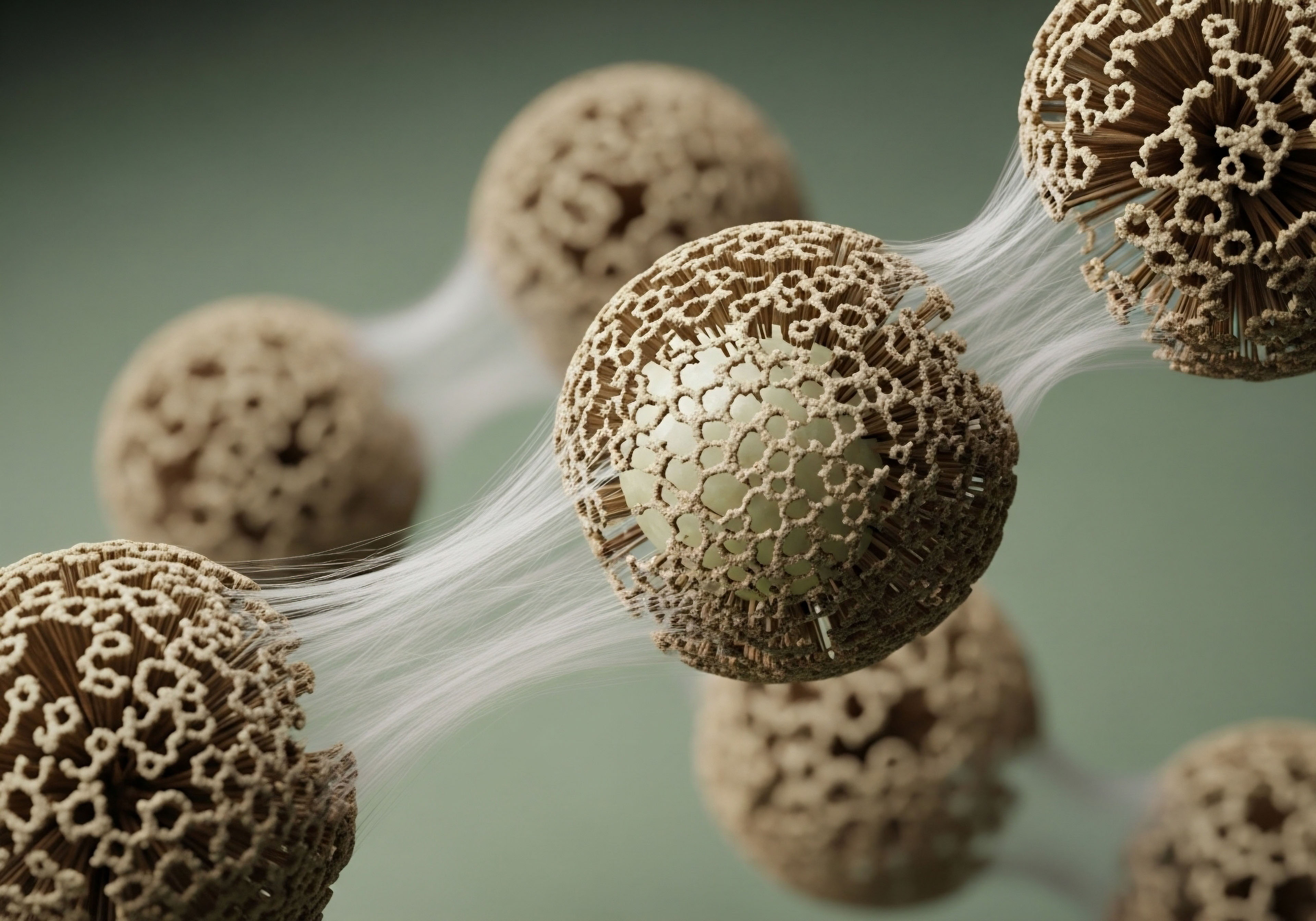

Fundamentals
That feeling of being emotionally frayed, where your capacity to handle stress feels diminished and your internal sense of stability seems to have waned, is a deeply personal and valid experience. You may have noticed that your reactions to daily challenges are more intense, or that a persistent sense of unease has settled in.
This experience is directly linked to the intricate communication network within your body, a system orchestrated by hormones. When we ask if hormonal optimization can help you feel more resilient, we are truly asking if recalibrating this internal messaging system can rebuild your foundation for mental wellness. The answer is a definitive yes, and understanding how these systems function is the first step toward reclaiming your emotional fortitude.
Your brain is a primary target for the hormones that regulate your reproductive and metabolic systems. Estrogen, progesterone, and testosterone are powerful signaling molecules that profoundly influence the very chemistry of your thoughts, moods, and cognitive clarity. Think of them as essential regulators for the neurotransmitters that govern your mental state.
Estrogen, for instance, is a key supporter of serotonin and dopamine production. These are the chemicals responsible for feelings of well-being, motivation, and pleasure. When estrogen levels fluctuate and decline, as they do during perimenopause and menopause, the brain’s ability to produce these mood-sustaining chemicals is compromised, leading to symptoms like low mood, irritability, and a general sense of flatness.
Hormonal shifts directly alter the brain’s chemical environment, impacting your ability to regulate mood and stress.
Similarly, progesterone plays a vital role in calming the nervous system. It does so by interacting with GABA receptors in the brain, which are responsible for producing a sense of tranquility and contentment. A decline in progesterone can leave the nervous system in a state of heightened alert, contributing to feelings of anxiety, restlessness, and difficulty sleeping.
For men, testosterone is a critical driver of dopamine activity, which is tied to motivation, confidence, and a sense of vitality. As testosterone levels decline with age, a condition known as andropause, men often experience a significant drop in their mental drive, an increase in irritability, and a diminished sense of resilience.
The experience of “brain fog” is another common symptom tied directly to hormonal health. This feeling of mental cloudiness, difficulty concentrating, or struggling to find the right words is not a personal failing; it is a physiological consequence of hormonal imbalance.
Estrogen is crucial for healthy blood flow to the brain and for supporting the neural circuits that govern memory and focus. When these hormonal supports are withdrawn, cognitive function can feel sluggish and unreliable. Recognizing that these symptoms have a biological basis is the starting point for addressing them effectively. Hormonal recalibration therapies are designed to restore these essential chemical signals, thereby providing your brain with the resources it needs to foster emotional resilience and mental clarity.


Intermediate
Understanding that hormonal fluctuations are at the root of diminished mental resilience allows us to explore the specific clinical protocols designed to restore balance. These hormonal optimization strategies are precise, data-driven interventions tailored to an individual’s unique biochemistry.
The goal is to replenish the specific hormones that have declined, thereby re-establishing the physiological conditions necessary for stable mood and sharp cognition. This process involves a detailed assessment of your symptoms and comprehensive lab work to create a personalized therapeutic plan.

Protocols for Female Hormonal Resilience
For women navigating the complexities of perimenopause and menopause, hormonal therapy is focused on replenishing estrogen and progesterone, and in many cases, testosterone. These hormones work in concert to support neurological health. Estrogen therapy is fundamental to alleviating many of the psychological symptoms of menopause.
By restoring estrogen levels, we directly support the brain’s serotonin and dopamine systems, which can significantly improve mood and reduce feelings of depression. Progesterone is prescribed to balance the effects of estrogen and for its own calming properties through its action on GABA receptors.
Testosterone, often overlooked in female health, is a critical component of mental wellness for many women. A low dose of testosterone can dramatically improve mood, energy levels, and cognitive function. It is particularly effective in addressing the mental fatigue and low motivation that can accompany hormonal changes. The application of these hormones requires precision and is based on a woman’s individual needs and menopausal status.
- Testosterone Cypionate ∞ Typically administered as a weekly subcutaneous injection of 10-20 units (0.1-0.2ml), this protocol provides a steady level of testosterone to support mood and cognitive energy.
- Progesterone ∞ This is prescribed based on whether a woman is in perimenopause or post-menopause, often as a nightly oral capsule to promote restful sleep and reduce anxiety.
- Pellet Therapy ∞ For some individuals, long-acting testosterone pellets, sometimes combined with anastrozole to manage estrogen conversion, offer a convenient and effective delivery method.

Protocols for Male Hormonal Resilience
For men experiencing the symptoms of andropause, including irritability, low mood, and cognitive decline, Testosterone Replacement Therapy (TRT) is the cornerstone of treatment. The objective of TRT is to restore testosterone levels to an optimal range, which in turn supports dopamine activity in the brain, enhancing motivation, focus, and emotional stability. A well-managed TRT protocol is more than just testosterone; it is a comprehensive system designed to maintain balance across the entire endocrine system.
A properly designed hormonal therapy protocol is a comprehensive system aimed at restoring the body’s natural signaling pathways.
The standard protocol for TRT involves weekly injections of Testosterone Cypionate. This is often combined with other medications to ensure the body’s hormonal feedback loops remain healthy and to mitigate potential side effects.
| Medication | Purpose and Action |
|---|---|
| Testosterone Cypionate | The primary therapeutic agent, administered weekly to restore testosterone levels, improving mood, energy, and cognitive function. |
| Gonadorelin | A peptide that stimulates the pituitary gland to maintain natural testosterone production, which helps preserve fertility and testicular function. |
| Anastrozole | An aromatase inhibitor that blocks the conversion of testosterone to estrogen, preventing side effects like water retention and moodiness. |
| Enclomiphene | May be included to support the production of Luteinizing Hormone (LH) and Follicle-Stimulating Hormone (FSH), further supporting the natural hormonal axis. |

How Do Peptide Therapies Enhance Mental Wellness?
Beyond foundational hormone replacement, certain peptide therapies can be used to specifically target pathways related to cognitive function and well-being. Peptides are small proteins that act as highly specific signaling molecules in the body. Therapies using peptides like Sermorelin or Ipamorelin/CJC-1295 are designed to stimulate the body’s own production of growth hormone.
Improved growth hormone levels are associated with better sleep quality, which is foundational for mental resilience, as well as enhanced cognitive function and a greater sense of overall well-being. These peptides offer a targeted way to support the body’s restorative processes, which are often compromised by hormonal decline.


Academic
A sophisticated examination of hormonal influence on mental resilience requires a deep appreciation for the intricate dynamics of the neuroendocrine system. The psychological symptoms that arise during major hormonal transitions are manifestations of significant shifts in the biochemical environment of the central nervous system.
Hormonal therapies achieve their effects by acting directly on the neural circuits that regulate mood, cognition, and stress response. The efficacy of these interventions is rooted in their ability to restore function to critical signaling pathways that have been disrupted by the natural decline of gonadal hormones.

The Hypothalamic-Pituitary-Gonadal Axis and Neurotransmitter Modulation
The Hypothalamic-Pituitary-Gonadal (HPG) axis is the master regulatory system controlling reproductive hormones. Its function extends far beyond reproduction, exerting profound control over neurological health. Gonadal hormones, specifically estradiol and testosterone, are powerful neuromodulators. Estradiol, for example, has been shown to influence the density of serotonin and dopamine receptors in key brain regions like the hippocampus and prefrontal cortex.
It also modulates the synthesis and metabolism of these neurotransmitters. The decline of estradiol during menopause leads to a downregulation of these systems, providing a clear neurobiological explanation for the increased prevalence of depressive symptoms. Hormone replacement therapy, by restoring circulating levels of estradiol, can effectively reverse these changes, leading to improved synaptic plasticity and neurotransmitter function.
Testosterone exerts similar powerful effects, particularly through its influence on the dopaminergic system. Research indicates that testosterone modulates dopamine release in the mesolimbic pathway, which is critical for motivation, reward processing, and executive function. The decline in testosterone during andropause is associated with a reduction in dopamine signaling, which clinically presents as apathy, low motivation, and cognitive fatigue. TRT works by replenishing the substrate for this system, thereby enhancing dopaminergic tone and improving these essential mental functions.

What Is the Role of Progesterone in Anxiolysis?
Progesterone’s contribution to mental resilience is primarily mediated through its metabolite, allopregnanolone. Allopregnanolone is a potent positive allosteric modulator of the GABA-A receptor, the primary inhibitory neurotransmitter receptor in the brain. Its action is similar to that of benzodiazepines, producing anxiolytic and sedative effects.
The fluctuating and eventual decline of progesterone during perimenopause leads to a loss of this endogenous calming mechanism. This can result in a state of heightened neuronal excitability, which manifests as anxiety, irritability, and insomnia. The administration of progesterone in a hormonal therapy regimen restores the production of allopregnanolone, thereby re-establishing inhibitory tone in the brain and promoting a state of emotional calm.
| Hormone | Primary Neurotransmitter System Affected | Clinical Impact of Decline | Therapeutic Effect of Restoration |
|---|---|---|---|
| Estradiol | Serotonin & Dopamine | Low mood, depression, cognitive fog | Improved mood, enhanced cognitive clarity |
| Testosterone | Dopamine | Low motivation, fatigue, irritability | Increased drive, improved focus, stable mood |
| Progesterone | GABA | Anxiety, insomnia, irritability | Reduced anxiety, improved sleep, calmness |

Can Growth Hormone Peptides Affect Brain Health?
The use of growth hormone secretagogue peptides like Sermorelin and Ipamorelin introduces another layer of neuroendocrine optimization. Growth hormone and its primary mediator, Insulin-like Growth Factor 1 (IGF-1), have significant neuroprotective and neurotrophic properties. They support neuronal survival, enhance synaptic plasticity, and promote neurogenesis.
One of the most significant benefits of optimizing the GH/IGF-1 axis is the profound improvement in sleep quality, particularly slow-wave sleep. This deep, restorative sleep is essential for synaptic pruning, memory consolidation, and the clearing of metabolic waste from the brain. By improving sleep architecture, these peptide therapies provide a foundational pillar for cognitive function and emotional resilience, complementing the direct neuromodulatory effects of gonadal hormone replacement.
- System-Wide Impact ∞ Hormonal therapies do not target single symptoms; they restore function to entire physiological systems that govern mental well-being.
- Neurotransmitter Support ∞ The restoration of gonadal hormones provides direct support to the serotonin, dopamine, and GABA systems, which are fundamental to mood regulation.
- Cognitive Enhancement ∞ Hormonal and peptide therapies enhance cognitive function by supporting neuronal health, improving sleep quality, and optimizing blood flow to the brain.

References
- Accurso Aesthetics. “The Emotional and Mental Health Benefits of Hormone Replacement Therapy.” 2025.
- Blankenship, Shawn. “How Hormonal Shifts Affect Mental Health ∞ and How Hormone Replacement Therapy (HRT) Can Help.” Holistic, Inc. 21 May 2025.
- Bardwell, Emma. “Menopause, Mood Swings, and Mental Resilience.” Sylk.
- “Enhancing Mental Health During Menopause with HRT Psychotherapy.”
- “The Impact of Hormone Replacement Therapy on Mental Health.” 19 April 2024.

Reflection

Your Path to Renewed Vitality
The information presented here offers a map, connecting the feelings you experience to the intricate biological systems within you. It provides a framework for understanding how the recalibration of your internal chemistry can rebuild the foundations of your mental and emotional world. This knowledge is the first, most crucial step.
The next involves looking inward, recognizing the specific ways these changes have manifested in your own life. Your personal health journey is unique, and a path toward renewed vitality is best navigated with expert guidance that honors your individual experience. The potential for you to feel resilient, clear, and fully yourself is not just a possibility; it is a physiological reality waiting to be restored.

Glossary

progesterone

testosterone

perimenopause

estrogen

andropause

cognitive function

mental resilience

anastrozole

trt

hormone replacement

peptide therapies

growth hormone




